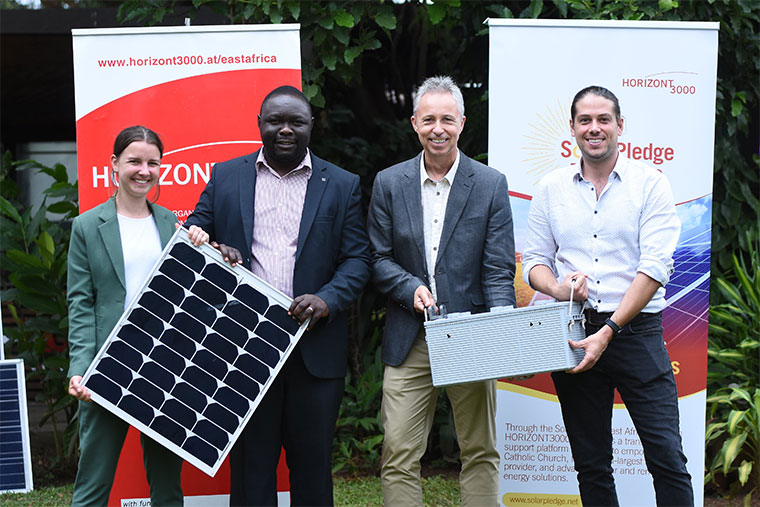
Uganda and Kenya are set to pilot the joint East African solar project through the Catholic dioceses of Gulu in northern Uganda and Ladwor in Turkana, Kenya aimed at addressing community clean energy needs.
The project by Horizont 3000 dubbed; Solar Pledge East Africa, will see the Austria-based organization sustainably integrate solar enertgy into the all-power needs of the communities from households to public entities such as hospitals.
Bishop Jonny Mbubi of the Catholic Diocese of Ladwor in Kenya while speaking at the launch of the project at Fairway hotel in Kampala pointed to the extreme weather conditions in the Turkana region, and how this project will enable them to turn these adversities into opportunities.
“The Turkana region witnesses extreme sunshine all throughout the year, we never get to see any clouds, only clear skies. Solar power, therefore, is the answer that will enable our communities to live better and more productive lives by harnessing the power of this resource that is available in plenty,” Mbubi noted.
The Catholic Church has been a leading advocate for environmental conservation. Pope Francis through the church proclamation of Laudato SI’ rallied the church and the world to work towards loving and caring for the environment.
Gulu Diocese Archbishop John Baptist Odama re-emphasised this proclamation, saying that after long decades of war and destruction, his diocese needed all the support it can get in reconstruction and preservation of the environment.
Odama noted that his diocese has over 300 primary schools supported by the Church, 39 secondary schools, 17 health centres, and 2 big hospitals that are in urgent need of renewable energy such as solar. He added that Solar Pledge East Africa provides a good opportunity for the area to fast track its development efforts and catch up with the rest of the country after the long civil war of the LRA rebels.
Brian Isabirye, commissioner renewable energy at the ministry of Energy and Mineral Development, noted that having a renewable energy officer at the diocese will give a chance to the ministry to pilot a project that they have been struggling to put in place.
“This project is also innovative and the fact that it is going to look into partnerships will bring in religious leaders, development partners, missions, and leaders that will bring us together to discuss renewable energy. We believe in partnerships because we cannot do too much if we do not partner,” he said.
Isabirye revealed that the ministry of Energy has been looking at how they can leverage power in renewable energy and they appreciate the power of using religion in driving transformation.
“We see this project having a number of benefits for the country and the church. Embracing clean energy is key and having the church at the centre of this project is the right thing to do. Adopting clean energy and efficient practices around energy gives us an opportunity to support the vulnerable poor,” added Isabirye.
According to Erwin Eder, managing director Horizont 3000, the pilot phase will last for a period of two years with technical advisors from Austria set to help in setting up the project.
"Adopting clean energy and efficient practices around energy gives us an opportunity to support the vulnerable poor.”